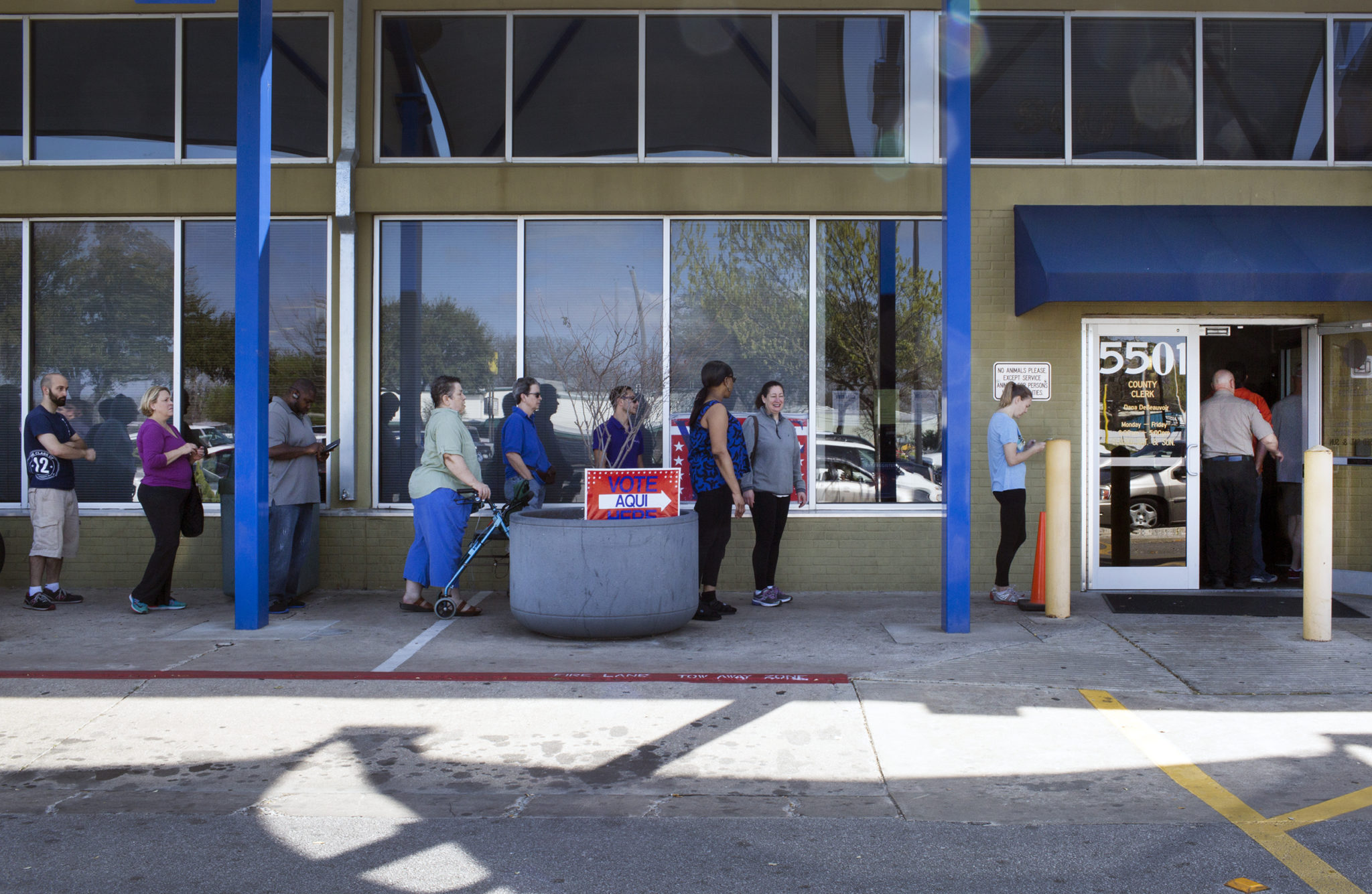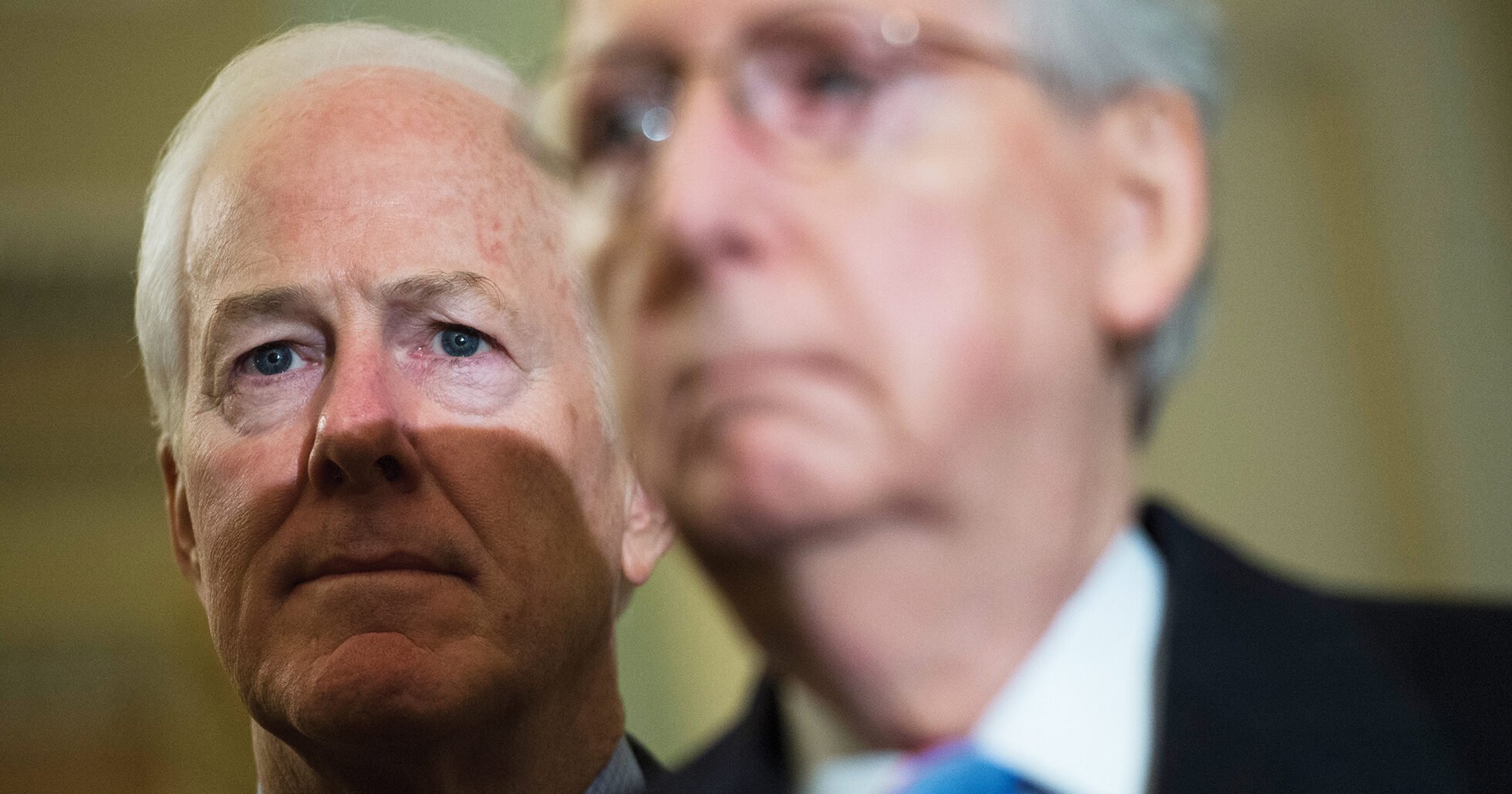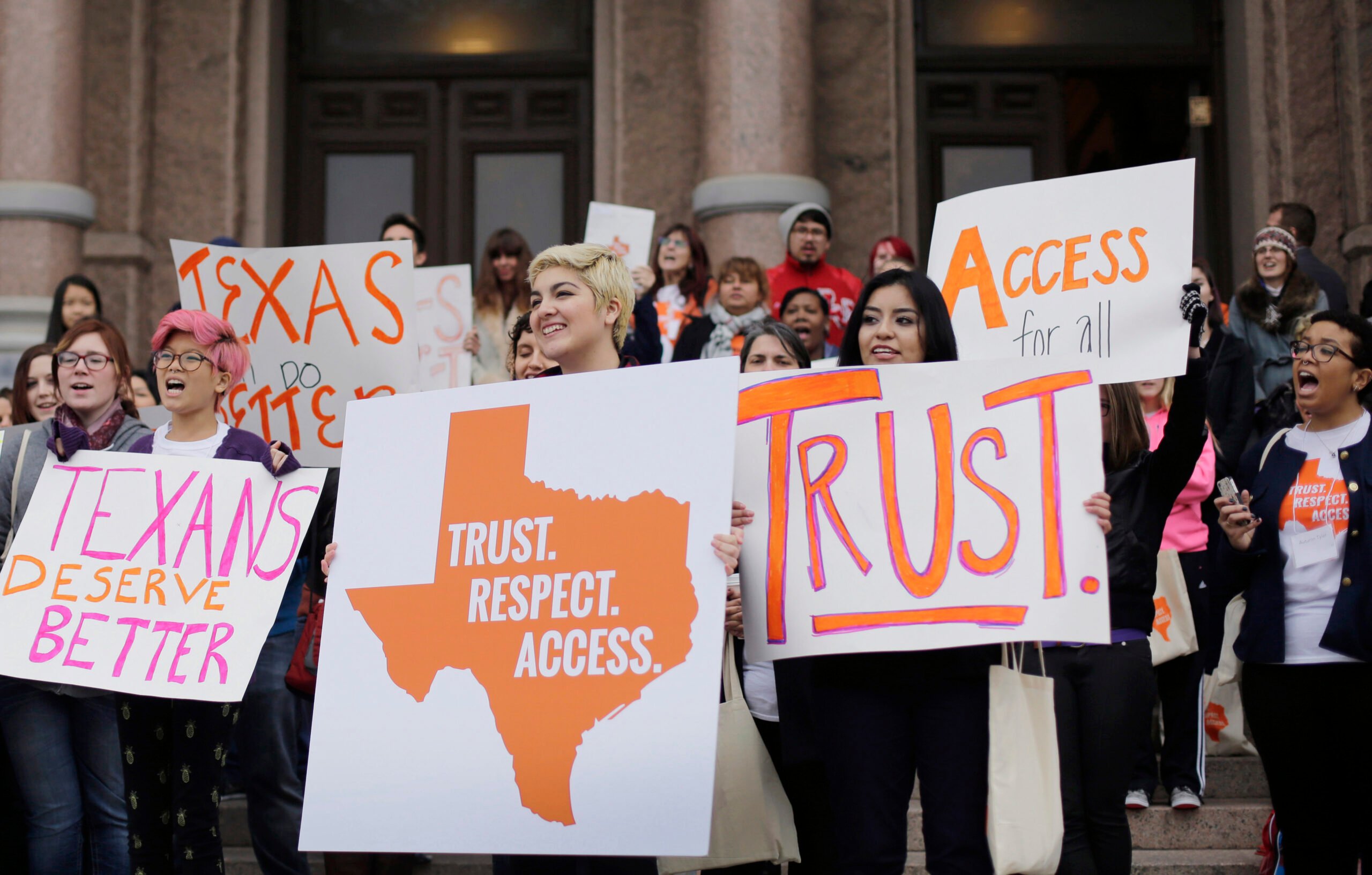
Primary Concerns: What We’re Watching on Super Tuesday
After months of flip-flopping narratives, GOP infighting and the devolution of our national political conversation into 30 seconds of sustained yelling, Super Tuesday is upon us. Today, 13 states and one territory — shout out to you, American Samoa! — go to the polls, and the stakes couldn’t be … more stake-like.
Tonight, the Texas Observer will be monitoring returns at a live event in Austin (don’t worry, there will be beer), and our reporters and editors will be posting real-time updates on the latest developments. (Stay tuned for a link.)
For now, here’s what we’re watching in advance of the returns:

Patrick Michels: Texas public schools are one battleground (is that name still taken?) in the Forever War within the state GOP, and this primary season, the split generally comes down to candidates’ enthusiasm for school choice in general and private school vouchers. So far under House Speaker Joe Straus, no school vouchers bill has gotten out of that chamber, and rarely have any such bills come up for a floor vote. Many candidates backed by Empower Texans and Texans for Education Reform hope to change that in 2017. On the other side, candidates backed by Texas Parent PAC are more likely to support a status quo that includes no vouchers and at least as much funding for public schools as they get today.
But education — school choice in particular — isn’t a solely partisan issue, and school reformers have poured a ton of money into one Democratic House race in particular. Former state Representative Chente Quintanilla of El Paso has raised $250,000 from Texans for Education Reform in his bid to unseat Mary Gonzalez, who has been a leading critic of school privatization ideas and an advocate for more public school funding in the past two sessions.
Much of the money in these races only surfaced late in the campaign season. Parent PAC, in particular, withheld its endorsements and contributions until the last few weeks before the primary. Once they were out, though, the group drew fire from school reform groups, attacking the so-called “Butt lobbyists” (as in, H-E-B grocery magnate Charles Butt, one of Parent PAC’s top contributors) as Democrats in disguise and servile minions of Big Education.
“Groups like Empower Texans and Texans for Education Reform say it is all about ‘school choice,’ but it is really all about greed,” Parent PAC chair Carolyn Boyle wrote me in an email. “They look at Texas schoolchildren and see dollar signs.”
The stakes for public education are high, not only in the voucher fight but because the winners on Tuesday night will probably be the ones who respond to whatever comes of the giant pending lawsuit against the school finance system. They may even be the ones crafting a new system, and they’ll be doing so without the benefit of retiring Public Education Chairman Jimmie Don Aycock.
Last, I’ll be keeping an eye tonight on the East Texas State Board of Education race to replace Thomas Ratliff, a Republican as loathed as Joe Straus in some conservative circles. Years ago, Ratliff — who does not behave as though his elected office comes with a license to shave a few million years off the age of the planet — ousted former creationist-in-chief Don McLeroy for the seat, and this year’s race will once again be a microcosm of the board’s larger split. It’s one that generally comes down to: “Creationism: yah or nah?” and the candidates have some … interesting thoughts on the matter. Mary Lou Bruner — a former school teacher! — has been flying her Jesus-on-a-dinosaur banner high (as well as her LBJ-probably-killed-JFK banner), while the Homeschool Coalition-endorsed Hank Hering has run a lower-profile campaign but still drawn support from conservative grassroots groups. Lufkin ISD board president Keven Ellis has the backing of public school insiders in this race.
The SBOE is a very strange political body. Its responsibilities concern very narrow, often technocratic, matters of curriculum, charter school approval and money management. Its meetings also perpetually verge on all-out circus performances, and not in a good way. Any one of its 15 members has the opportunity to derail the board, and Bruner, at least, seems up to the task. Asked by Breitbart Texas about her past assertions that President Obama was “a gay prostitute in his twenties” and that baby dinosaurs rode with Noah on his ark, she said, “I don’t intend to apologize for my opinions because I still believe my statements were accurate.”
***

Chris Hooks: Tonight’s results could be a real game change moment for the senator close to our Hearts, Texas’ own Ted Cruz. It could be a real opportunity to double down, where Cruz raises the stakes and wins the big mo, momentum, as he heads into — no, I’m kidding. For all the interest in making each day of this hellacious, never-ending campaign a make-or-break moment, we already know what’s likely to happen tonight, at least in Texas, at least for Cruz. Most polls say he’s going to win, by a little bit. That doesn’t change much for him or for Trump, who’s in second in most polls. If Trump wins, or Cruz wins by a huge margin, it will be a different story. But that doesn’t seem likely.
I’ll be watching results with the senator at Houston’s Redneck Country Club, the domain of right-wing radio host Michael Berry, along with Rick Perry, Dan Patrick and Greg Abbott. In terms of delegates, here’s a very simple version of what I’ll be looking at: About 50 of Texas’ 155 delegates are distributed on a statewide basis, and the rest are assigned three apiece to the winner of each of the state’s congressional districts. If a candidate gets a majority of the vote statewide or in a congressional district, they take all of those delegates: If no one gets a majority, the delegates are divided proportionally among delegates who secure more than 20 percent of the vote.
So the crucial thing for Cruz is not necessarily how he does, but whether Rubio can break Texas’ 20 percent barrier statewide and in at least a few congressional districts. In recent polls, he’s a couple points behind. If Rubio pulls it off, the haul of delegates Cruz takes from Texas decreases significantly, and the media — and Beltway Republicans — will dub Rubio the True Winner of the Texas primary.
What else matters to Cruz-watchers? Well, if he wins anywhere besides Texas, of course. He’d like to win Oklahoma. But that’s unlikely, since the bottom fell out of his Southern strategy weeks ago. If Cruz wins Texas, and Rubio wins nothing, expect to hear a lot of talk from the Cruz camp about how Rubio should drop out, especially if he loses his own home state of Florida on March 15. But Trump looks like he’s going to be the nominee regardless, so in reality the two Cubans are fighting over tiny slices of a shrinking pie. What a dismal year, this. Hoo, boy.
Oh, yeah, and while Cruz may not win any more states today, there’s a contest in American Samoa, and it’s actually potentially important. There’s a rule in the Republican party’s bylaws that says a candidate must win a majority of eight delegations to be eligible for consideration as the nominee. Cruz is aiming for the delegations in the U.S. territories as a way of getting to eight, and Samoa is one of them. He also hopes to win Guam and the Northern Marianas. As a maximally zany finish to this year’s primary, I, for one, am rooting for Cruz to beat Trump at a brokered convention thanks to the civic zeal of Pacific Islanders. It’s Democracy, folks.
***

Forrest Wilder: I’ll be keeping an eye on Texas’ other political party tonight. No, not the tea party, but the Democratic Party. Presidential race aside, there’s not as much ballot action for Democrats as for Republicans, and the intraparty schisms are not as deep, but there are still some important races and themes to watch.
Crash and Bern? My purely horse-race analysis: Coming off a dismal performance in South Carolina, largely due to anemic African-American support, Bernie Sanders is facing difficult odds on Super Tuesday. In Texas, he trails Hillary by 20 points or more in recent polls. My highly anecdotal sense of the race is that many Democratic voters still don’t know much about him. Hillary, on the other hand, is a well-known (for better or worse) and generally well-respected figure among Democrats who reliably go to the polls in Texas. I’d wager that Hillary will put up huge margins tomorrow in rural and Latino parts of Texas. Bernie will do well in Austin and other liberal, youthful precincts.
The Gene Kelly Effect: Texas Democrats are almost perennially embarrassed by what you might call the Gene Kelly Effect — the depressing tendency of many Democratic primary voters to vote for a name they recognize on the ballot, without any regard to the person’s experience or qualifications.
Gene Kelly is the clever/annoying fellow who shares a name with a long-dead dancer and ran repeatedly in the ’90s and ’00s, garnering millions of votes and forcing expensive and time-consuming runoff elections without even pretending to run a campaign. (Perhaps it’s also a reflection of the electorate’s average age, since the dancer Gene Kelly’s heyday was in the ’40s and ’50s.)
Though Gene Kelly hasn’t run for office since 2008, a new spoiler has arrived on the scene. His name is Grady Yarbrough and his last name sounds awfully similar to (but is in fact different from) Ralph Yarborough, the legendary liberal Texas senator. In 2012, Yarbrough won 26 percent of the vote in a four-way race to be the Democratic nominee for U.S. Senate. That was enough to muscle his way into a runoff with former state Representative Paul Sadler and score 37 percent of the vote.
This year, Yarbrough is running against former state Rep Lon Burnam and Democratic labor activist Cody Garrett for a spot on the Texas Railroad Commission. Burnam is by far the most serious candidate — if measured by endorsements, money raised, legislative experience, etc. Can Burnam (or Garrett) clear 50 percent and avoid a costly runoff, or will Yarbrough, like Gene Kelly, be singin’ in the rain (of ballots)?
Turnout: In terms of early voting, the Texas GOP turnout was very good compared to 2008 and 2012. Republicans are flocking to the polls because they have a shitshow of a race on their hands and the fate of their party, not to mention the Republic, hangs somewhat in the balance. Plus: Trump.
Final early vote totals for the biggest 15 Texas counties. #txlege (via Stefan Haag) pic.twitter.com/odZU7VNFHx
— Michael Li (@mcpli) February 27, 2016
It’s unclear if high GOP turnout redounds to Trump but it seems likely, given the way he’s energized many who do not fit within the Soccer Moms/NASCAR Dads Republican voting blocs. Cruz could also benefit from engaging the extensive grassroots network of tea party clubs and activists that he’s intimate with.
Democratic turnout, on the other hand, has been middling, about half-way between 2008 and 2012. Low turnout for the Dems may also suggest trouble ahead in the general election. All else being equal, a fired-up campaign trumps, or Trumps, one that is apathetic. If Hillary is the nominee, she’s going to need to capture some of the grassroots enthusiasm Bernie inspired, or at least hope Trump (assuming he’s the nominee) is so repulsive to voters that he causes the mother of all backlashes.
***

Naveena Sadasivam: The Texas Railroad Commission race is, let’s face it, neither exciting nor likely to be a major game changer. Most voters have no idea what the RRC does or why it’s important, thanks in part to its infamously cryptic name. And as a down-ballot race, voters are likely to be under-informed about candidates, allowing luck to play an outsized role in selecting a commissioner.
The RRC is actually really important. It’s responsible for regulating the oil and gas industry and overseeing pipeline safety and mining. So the regulations it adopts and how it chooses to implement them have major implications for the multi-billion dollar fossil fuel industry, which contributed close to $14 billion to state coffers last year.
On the GOP side, seven candidates are vying for the commission seat to be vacated by David Porter, who unexpectedly ended his bid for re-election in December. At least three — Lance Christian, Ron Hale and Weston Martinez — are token candidates. They’ve spent a couple thousand dollars on their campaigns, and with little political experience they’re unlikely to secure double-digit percentage points. The frontrunners are former state Representative Wayne Christian, who ran in 2014 for a seat on the RRC and lost to Ryan Sitton in a runoff; John Greytok, an attorney and longtime Republican activist, and Gary Gates, the wealthy real estate developer who loaned his campaign $2 million.
Gates has never held public office, but has run six other times and lost. Wayne Christian has spent about $35,000 and has relatively more name recognition, having run just two years ago for a commission seat; He was also a multi-term Rep for an East Texas district. So, will Gates’ big bet pay off? Or, will Texas voters pick Christian?
To be clear none of the GOP frontrunners inspire confidence for the future of Texas’ natural resources. They’ve all said they will help the industry by cutting taxes, establishing a moratorium on new regulations and restraining government involvement. They’ve all toed the party line, sticking to the “Obama’s EPA needs to be tamed” rhetoric the GOP’s regulation-averse sensibilities demand.
The Democratic field couldn’t be more different. Longtime environmental activist and nine-term Fort Worth state Representative Lon Burnam — who has the backing of major environmental groups and a record of working in the state legislature to promote renewable energy — will face Cody Garrett, a former journalist, and Grady Yarbrough, a retired public school teacher. All three candidates have said the RRC needs to be tougher on the oil and gas industry.
With seven Republicans and three Democrats running, there’s a distinct possibility both primaries will result in runoffs. Whatever the result, the chances of a Democratic candidate winning in the general election are somewhere between slim and none. The last time voters elected a Democratic commissioner was in 1993. And that was before the state’s fracking boom put everyone under a spell.
***

John Wright: The future of LGBT rights in Texas hangs in the balance today. If enough tea party challengers defeat establishment Republicans in primaries for Texas House, it could tip the scales in favor of anti-LGBT legislation in 2017.
As a result, LGBT advocates may find themselves in the uncomfortable position of quietly rooting for Republican incumbents, including Speaker Joe Straus and Representatives Byron Cook and Charlie Geren. Of course, they’ll also be keeping a close eye on the presidential contest, where polls indicate LGBT voters are evenly divided between Clinton and Sanders, as well as numerous other down-ballot Democratic primaries.
El Paso state Representative Mary Gonzalez is an LGBT pioneer, and her defeat at the hands of Chente Quintinilla would be a major setback. Ditto for state Representative Jessica Farrar, an LGBT ally who’s facing a challenge from anti-gay activist Dave Wilson in District 148. On the flip side, if Gonzalez prevails and Huey Rey Fischer advances in District 49, the Texas House could be on its way to having three LGBT legislators in office the first time. Elsewhere, Lamar County Clerk Russ Towers is vying to become the first openly gay Republican elected in Texas’ history.
Fischer, Gonzalez and Towers are among dozens of openly LGBT candidates whose victories could boost the community’s electoral representation in the state. Those candidates also include Democrats Kim Ogg and John Sisson, respectively, in races for Harris County district attorney and Travis county sheriff.
Finally, in West Texas’ Congressional District 19, retired Col. Michael Bob Starr has come under fire from other GOP candidates for participating in LGBT Pride runs when he served as a commander at Dyess Air Force Base in Abilene. If Starr wins, one of the nation’s most conservative districts would be represented by someone who is arguably moderate on LGBT issues, and the outcome could serve as a barometer of where the movement stands.
***

Andrea Grimes: Before I talk about what I’m watching for tonight, let’s have a look back at what’s happened with the presidential narrative that’s played out over the last year. Last winter, pundits and politicos were praising the better-than-2012 GOP field coming out of the gate, pegging Jeb Bush, Scott Walker, Marco Rubio and Rand Paul for likely leaders. Politico’s week-one coverage in February 2015 had Ted Cruz ranked below those four, pulling up the rear for “most likely to win.”
But that was before Donald Trump Kool-Aid-manned himself into the race. The day The Donald announced his presidential bid last June, Politico called his campaign “quixotic.” By July, the Washington Post was openly marveling at Trump’s pending appearance in a GOP debate. The New Republic even shook a righteous fist at the media for helping Trump score a spot on the stage, declaring in their headline: “Donald Trump is not the frontrunner. Smarter polls would prove it.”
Like a frat boy rallying the brothers after a midnight beer run, Trump turned an otherwise unexceptional party into a straight rager by thoroughly one-upping his fellow Republicans with amped-up border fearmongering. By the summer, the New Republic had changed its tune on Trump, calling him a “serious candidate” despite his status as the GOP’s “greatest troll.” But at the same time, even our own Chris Hooks predicted Trump would “eventually flunk out,” leaving Ted Cruz to carry the banner for the rightest of the right wing.
The fall saw the field shrink, with Rick Perry bowing out in September and Bobby Jindal in November. Then came the mass February exodus: Mike Huckabee ditched February 2, Carly Fiorina and Chris Christie persevered for another week or so, and Jeb Bush bailed mid-month.
John Kasich and Ben Carson have held on, only to play walk-on roles in the three-man circus starring Cruz, Rubio and Trump. But even as recently as last week, the phrase “If Trump turns into a serious candidate” was appearing in actual news stories, as if there’s any question as to whether his make-America-fascist-again platform is resonating with the electorate. Demonstrably, it is.
Tonight, the question is whether Cruz or Rubio can do anything to stop the Trump train. I think we’ll all be better off accepting that they can’t, and instead start prepping ourselves for the inevitable Trump nomination — and trying to figure out what, if anything, a Dem nominee can do about it.
That’s right — there’s also a Democratic presidential primary going on! It’s rather quaint, really. Hillary Clinton and Bernie Sanders, who struggle to appeal to each other’s superfans, have been out there having relatively substantive debates about issues pertinent to the lived reality of the left-leaning electorate. They’ve both been confronted by Black Lives Matter protesters demanding conversations about racial justice and responded, even if not spectacularly. They’ve talked about repealing the Hyde Amendment. They’re going to Flint.
Sanders and Clinton are imperfect, but they’re not talking about burning American democracy to the ground, so there’s that. Meanwhile, the boys left in the GOP sandbox fling around racist fantasies and schoolyard insults.
The down-ballot GOP races here in Texas don’t differ too much in tone, really, from what’s happening in the party’s presidential field. That’s thanks mainly to the Texas tea party crew and ringleader Michael Quinn Sullivan, who put up hyper-right candidates to challenge the “RINOs” in the Lege. I’ll be keeping an eye on those races, as Joe Straus, Charlie Geren and other longtime Lege Republicans work to swat off the flies.
As for Texas Dems, I’m following the lib versus lib versus lib versus lib versus lib versus lib versus lib contest for House District 49, the seat vacated by long-time Austin state Representative Elliott Naishtat. This one’s almost sure to go to a runoff, but it will be interesting to see which flavor of progressive Austinites choose. Top contenders are former Austin ISD board president Gina Hinojosa, “a bike-riding, Selena-listening, vegetarian Austinite” Huey Rey Fischer, legal eagle Heather Way and former NARAL Pro-Choice Texas and ACLU of Texas lobbyist Blake Rocap.
If you’re in Austin, cruise on downtown to the Companion gallery next to Wright Bros. Brew & Brew, and join me and the rest of the Observer team at our primary watch party. If you can’t make it, we’ll be live-blogging all night long, so keep an eye on the homepage for the latest.
[Featured image: Jen Reel]


